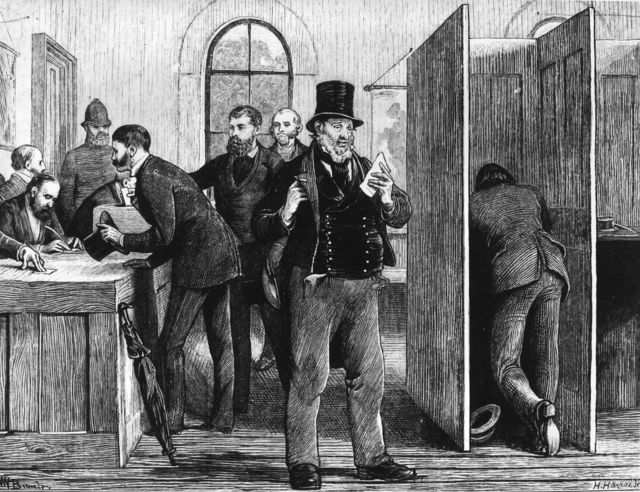Today is Thursday and time for Rain's Thursday Art Date, or TAD. I'm going to talk about a subject near and dear to me today: voting. On Tuesday (June 7), seven states held primary elections. They were California, Iowa, Mississippi, Montana, New Jersey, New Mexico, and South Dakota. Voting has never been more important than in this current climate.
Let’s begin with voting rights. In 1776 and before, only men who owned property, who were mainly white, Christian, and over 21, had the right to vote. The new country decided voting rights, which were similar to those in England.
 These laws stipulated that only "free holding" men, or those who owned property and paid taxes, could vote.
These laws stipulated that only "free holding" men, or those who owned property and paid taxes, could vote.
 Fast forward to 1856, where all white men, whether they owned property or not, were given the right to vote.
Fast forward to 1856, where all white men, whether they owned property or not, were given the right to vote.
Let’s forge ahead to 1870, and the 15th amendment. “The right of citizens of the United States to vote shall not be denied or abridged by the United States or by any State on account of race, color, or previous condition of servitude.” This was followed closely after the 13th amendment that abolished slavery and the 14th amendment that guaranteed citizenship to African Americans had been signed into law. However, poll taxes, literacy tests, and grandfather clauses, along with threats against black men kept them away from the polls. Poll taxes in federal elections were abolished in 1964 by the 24th Amendment. Then came the Voting Rights Act of 1965, where all African Americans, even black women were finally allowed to vote.
 White or Caucasian women, on the other hand, have had the right to vote since 1918, when the 19th amendment was passed. There were some stipulations, though. If a white woman was over 30, she was allowed vote. Then in 1928, all white women over the age of 21 were allowed to vote.
White or Caucasian women, on the other hand, have had the right to vote since 1918, when the 19th amendment was passed. There were some stipulations, though. If a white woman was over 30, she was allowed vote. Then in 1928, all white women over the age of 21 were allowed to vote.
The 19th amendment prohibited discrimination on the basis of sex, but it did not address other kinds of discrimination that many American women faced: women who were excluded on the basis of race. Native American, Asian American, Latinos, and African American women had to fight long after the 19th Amendment was ratified.
Native American and Asian-American women were often denied citizenship by the federal government, meaning they could not vote because they were not recognized as citizens.
In 1924, American-born Native American women gained citizenship. But until as late as 1962, individual states still prevented them from voting on contrived grounds, such as literacy tests, poll taxes, and claims that residence on a reservation meant one wasn’t also a resident of that state. They also were faced with fees and "competency tests.”
Native-born Asian Americans already had U.S. citizenship in 1920, but first generation Asian Americans did not. Asian American immigrant women were therefore excluded from voting until the Immigration and Nationality Act of 1952 allowed them to gain citizenship more than three decades after the 19th Amendment. Despite being barred from citizenship and from voting, they joined Native American women in their quest to vote.
Latino women contributed to the success of the movement at both the state and federal levels. Literacy tests remained an effective means of keeping some Hispanic and other women of color from voting long after the federal amendment was passed. It took a 1975 extension of the Voting Rights Act, prohibiting discrimination against women who rely heavily on languages other than English. Now, non-English-speaking voters must be provided with instructions or assistance in registering and voting. Voters with limited English must be given access to translators and ballots in multiple languages.
In July, 1971, the 26th amendment lowered the voting age from 21 to 18.
Some African-American women in the north were able, with help of the 19th Amendment, to realize the rewards of their activism, but throughout much of the country the same voter suppression tactics that kept black men from the polls kept black women from voting, too. Literacy tests, poll taxes, voter ID requirements, intimidation and threats, and acts of violence were all obstacles. The struggle continued until the passage of the Voting Rights Act of 1965.
In 1984, the Voting Rights Act was expanded to include voting accessibility for the elderly and the handicapped.
Sadly, it doesn’t stop there. In 2013, a section of the Voting Rights Act was declared unconstitutional, leading to a massive wave of state laws establishing voter ID requirements, closed polling stations, restrictions on vote by mail, and limited voting hours. These included polling place closures, voter ID laws, limited early voting, and limits to pre-registration.
That is the case in Kansas. We were one of, or possibly the first state to require a valid voter ID card (driver's license, or state issued ID card). I read that one state now requires anyone over the age of 65, whether they have voted for the past (for example) 40 years or not, now must register with their city or county election office in order to vote in the upcoming election.
After the 19th Amendment, the work to secure the vote for all women has continued. It will continue until every woman in America who can legally vote has the right to do so.
Here are 25 places where and when women were given the right to vote:
New Zealand, 1893; Finland, 1906; Denmark, 1915; Iceland, 1915; Canada, 1916 (white females only); Russia, 1917; Germany, 1918; United Kingdom, 1918; United State, 1920; Brazil, 1932; Turkey, 1934; France, 1944; Japan, 1945; India, 1947; Greece, 1952; China, 1953; Mexico, 1953; Honduras, 1955; Egypt, 1956; Canada: First Nation women won the right to vote in 1960; Australia: Indigenous Australians won the right to vote in 1962; The Bahamas, 1962; Switzerland, 1971; Iraq, 1980; Oman, 1994; and Saudi Arabia, 2015.
Thanks for listening to my diatribe. I hope you vote in your primary and the general election this November. If ever there was a reason to exert your voice by voting, it is now!! That includes whatever country from which you are visiting today.
Now let's join Rain and her Thursday Art Date to see what others are sharing this week.




.JPG)













































































.JPG)

























17 thoughtful remarks:
Very interesting Elizabeth we take a lot for granted. Voting turnout in Ontario Canada was very low this pas June 2.
We still have a long way to go until all men and women eligible to vote in an election can vote without hinderance.
Very interesting, thanks. Since the Brexit I am not allowed to vote in Germany as England left the EU. And I'm not allowed to vote in England, because I live in Germany. Go figure! Hugs, Valerie
This is a fantastic read on the history of the vote. Thanks for your research on the subject. It is more important than ever to vote. Have a great day.
wonderful and interesting history here. I watched a PBS documentary about voting and women's rights and some of the pioneers. Sorry to say I had not heard of those women before...
Australian women got the right to vote in 1902. Sadly more than a hundred years later prejudice continues to thrive and has to be fought. Prejudice on all sorts of levels against all sorts of people.
Good post and I'm very glad you wrote it. We are on such shaky ground right now and I'm very concerned about voting rights for all of us as the right to vote is so determinedly being undermined.
Hope things settle down for you with the water and electricity. Ack.
Voting rights are a very important topic for our time. Your summary is timely and very thorough. It’s interesting history —I learned a lot about the struggle for women to vote when I visited a monument to the suffragists in Virginia a few months ago. Several states had already given women the right to vote, which encouraged the continuing efforts.
I can’t find anything about the age requirement of being over 30 that you mentioned, though. The sources I looked at say women over 21 could vote after the constitutional amendment, subject to racist laws in the states as you listed.
Best… mae at maefood.blogspot.com
This was an interesting read. I always wondered why suddenly states like NH were requiring ID in order to vote. I'm not so sure that having to preregister if you're over 65 is cool. It doesn't make a lot of sense. It almost seems like a modern form of voter suppression. Hope the power is back on by now. Hugs-Erika
See. This is why I get mad at those who do not care to vote.
Yes, it is "useless" when you know the party you could agree with say... 80% will not have a chance, but... respect those who fought for this right so hard and if you do not vote another party surely "gets" yours by your voice missing.
Young people in Germany, too many, just don´t care no more, being to disappointed of politics here (and anywhere).
Thank you for sharing this, Elizabeth! I'm sure it took a lot of effort and time to put the text and photos together. I voted yesterday. I'm so grateful that in Colorado we've been using mailed ballots for over 10 years and have convenient, nearby drop boxes to place our ballots in ~ The drop boxes are monitored 24/7. I like having the ability to sit down with my ballot, my computer, and of the election materials I have received. (And coffee!). I can research and carefully consider each person/issue on the ballot. While II've waited in line for hours in the past and would do it again if I had to, I appreciate the ability to sit down and vote at home (especially since I'm older). In Colorado voter fraud is very rare, and the state has lots of measures in place to make sure the vote is counted securely, accurately, and verified. Have a great weekend!
I always vote! It's a right and a responsibility.
This is really an interesting post, Elizabeth, and one with loads of research. I learned a few things today! I think our next election is the August primary. I'll vote absentee.
Hi, Elizabeth! Thanks for alerting me to your comment issues on my blog. I found them in my spam folder and posted them. And thanks for your kind words! Have a good one!
...my part of New York State was a hotbed for women's rights in the mid 1800s.
Yes and once again Republican run states are passing laws that make voting difficult for certain classes of people (interestingly most of which generally vote democrat)and thus once again we are faced with a voting right crisis at a time when elections can nullify our democracy. I have Republican friends who vote Republican because they are "Republicans", but have not paid attention to the fact that their Republican Party has been taken over by wealthy autocrats who are only interested in power and greed. We are in deep trouble and I fear for the outcome ... I never thought I would see this day :(
Thank you for your informative post Elizabeth ...
Andrea @ From the Sol
some great art for the subject :)
A nice history lesson Elizabeth. It wasn't that long ago that women were so oppressed...and in some areas still are.
Post a Comment